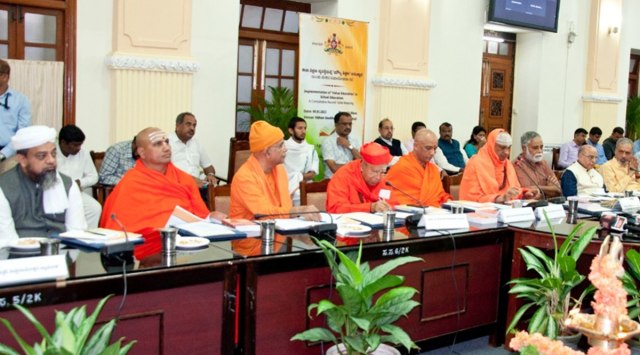Religious leaders, education experts, and officials of the department of school education and literacy held a meeting in Bengaluru Monday to discuss the modalities of the implementation of value-based education in the school curriculum in Karnataka.
The religious leaders deliberated on imparting faith-based value education in line with Indian ethos and the National Education Policy 2020. In addition, experts also suggested that teachers be trained and evaluated appropriately in terms of teaching value education.

The Karnataka government has been mulling to make value education a part of mainstream academics for a long time now. However, there is no structured curriculum for imparting value education in schools.
Story continues below this ad
According to School Education Minister BC Nagesh, an implementation committee will soon be formed to frame the curriculum for value education, which is expected to be introduced in the next academic year. “The religious seers, education experts, and management members of educational institutions have provided practical suggestions on implementing value-based education. We will soon form a committee of experts to work on the curriculum and will try implementing it from the next academic year,” said Nagesh.
Gangadendhra Saraswathi Swami of Shree Swarnavalli Matha said lessons from the Bhagavad Gita should be included in the value education programme. He further said, “It is important that appropriate food discipline is followed in order to address anger issues among students. Sattvic food can ensure the physical and mental well-being of children. In addition, we should also make yoga practice compulsory in the morning and encourage children to be early risers. This will enhance their concentration and help them focus better on their studies,” said the religious seer.
Noted spiritual leader Sri Sri Ravi Shankar said, “Value education is important to create a good personality. Moreover, we should first assess the teachers’ personality and character traits and train them in value education first. Only then can teachers spread unity, harmony, and other moral values among the children. A lot of states in north India and also some neighbouring states of Karnataka are witnessing a section of students consuming drugs. Bengaluru also faces this problem. It is important that through value education we address the drug menace in society.”
Vishvaprasanna Teerta of Pejawar Mutt said that value education should be introduced in the form of plays and visual graphics. “Value-based education should be more engaging and practical in nature. The government can work on introducing cartoons or short plays on value education, where children can express themselves through different characters,” said the religious seer.
Story continues below this ad
He added that “students should not be exposed to the chopping of meat in houses and marketplaces. In marketplaces, meat is displayed in the open, and children should avoid being exposed to such things because it can have a negative impact on them.”
Tejaswini Ananthkumar, the co-founder of Adamya Chetana, stressed on technological interventions in imparting knowledge. “There should be changes in the teaching methodology, which should be more out of the box. The government should also create a framework for teachers on how to train students differently. Technological interventions such as artificial intelligence and augmented reality should be used in imparting knowledge. Similar to corporate social responsibility, we should now start working on personal social responsibility,” said Ananthkumar, who also opposed the inclusion of eggs in mid-day meals.
Meanwhile, Peter Machado, archbishop of Bengaluru, said value-based education must address students’ mental health issues as well. He also insisted that value education be included in B Ed courses for teachers. Machado said that a committee comprising psychologists, education experts, and religious leaders be formed to draw up the curriculum for value education in sync with Indian traditions and culture.
Around 17 Hindu and Jain seers, Christian priests, maulanas, and politicians including state legislative assembly Speaker Vishweswar Hegde Kageri, Tejaswini Ananthkumar, AT Ramaswamy, and P Rajeev were present at the meeting. The meeting also saw the participation of educationists like K Kasturi Rangan, the chief architect of the National Education Policy, MR Doreswamy, and MK Sridhar, among others.









